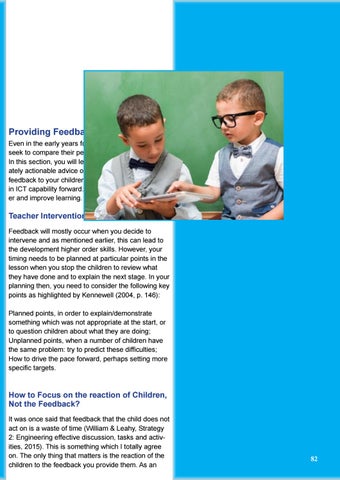Providing Feedback Even in the early years foundation stage, children seek to compare their performance with their peers. In this section, you will learn practical and immediately actionable advice on ways that you can provide feedback to your children that will drive their learning in ICT capability forward. It’s time to harness its power and improve learning.
Teacher Intervention Feedback will mostly occur when you decide to intervene and as mentioned earlier, this can lead to the development higher order skills. However, your timing needs to be planned at particular points in the lesson when you stop the children to review what they have done and to explain the next stage. In your planning then, you need to consider the following key points as highlighted by Kennewell (2004, p. 146): Planned points, in order to explain/demonstrate something which was not appropriate at the start, or to question children about what they are doing; Unplanned points, when a number of children have the same problem: try to predict these difficulties; How to drive the pace forward, perhaps setting more specific targets.
How to Focus on the reaction of Children, Not the Feedback? It was once said that feedback that the child does not act on is a waste of time (William & Leahy, Strategy 2: Engineering effective discussion, tasks and activities, 2015). This is something which I totally agree on. The only thing that matters is the reaction of the children to the feedback you provide them. As an
82











